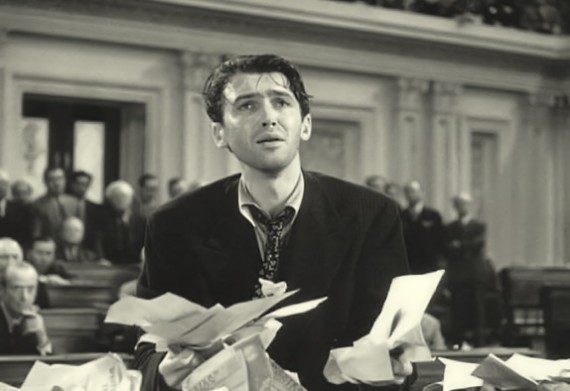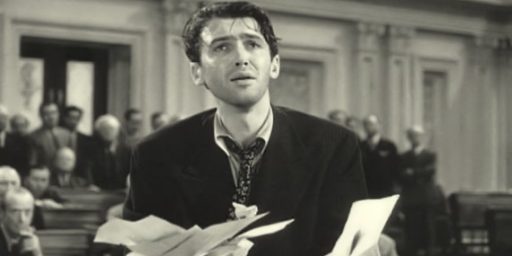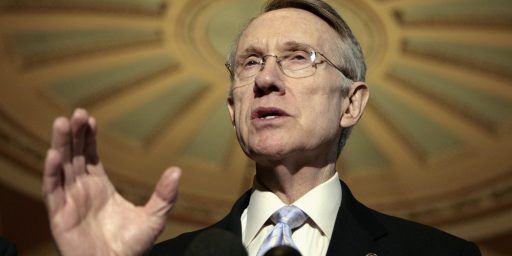No “Nuclear Option” On Filibuster Reform
Once again, Harry Reid is pursuing a far less ambitious filibuster reform package than originally threatened.
The Hill is reporting today that Senate Majority Leader Harry Reid is aiming for a far less ambitious form of filibuster reform than many on the left would probably like:
Senate Majority Leader Harry Reid (D-Nev.) will present colleagues with options for reforming the Senate’s filibuster rules in a Democratic caucus meeting Tuesday.
Reid and Senate Republican Leader Mitch McConnell (Ky.) are close to reaching a deal to speed the pace of work in the Senate, but some of the details remain unresolved.
The agreement between Reid and McConnell is not expected to include the talking filibuster, which would require senators who want to block action on legislation to actually hold the floor and debate for hours on end.
In recent days, Reid has begun to focus on a proposal to tweak the filibuster rule by requiring the minority party to muster 41 votes to stall a bill or nominee. Under current rules, the responsibility is on the majority to round up 60 votes to end a filibuster.
Reid will insist on reducing delays to motions to begin debate on new business and motions to send legislation to conference talks with the House, according to Senate sources.
Democratic proponents of filibuster reform emphasize that Reid does not yet have a final package. They are holding out hope that Reid can be persuaded to include the talking filibuster after a caucus debate.
A Senate Republican source said Reid and McConnell would present the rough outlines of a potential deal to their caucuses this week before finalizing it.
Reid will not trigger the so-called nuclear option on Tuesday, as some Republicans have feared. Under the nuclear option, Reid could change the Senate’s rules with a simple majority vote.
None of this is surprising. As the report goes on to note, several senior Democratic Senators were against some of the more radical filibuster reform ideas out there and were against using the so-called “nuclear option” to push such reforms through. Many of them are the same Senators who resisted radical filibuster reform two years ago, ranging the ideological spectrum from Dianne Feinstein to Joe Manchin. Additionally, not withstanding his comments on the Senate floor last year, Reid seems reluctant to push the “nuclear option” button, not only because there may just be enough defectors in his own caucus to oppose the reforms, but also because doing so would destroy any idea of comity in the Senate and make his job even more difficult. Thus, he’s chosen to pursue the option of working out a deal with McConnell that will get at least some reforms accomplished — and doing things like getting rid of filibusters on motions to proceed will do much to speed up the pace of Senate business — rather than going the radical route. It’s sure to disappoint the pundits on the left who likely love to see the filibuster end entirely, but it’s probably the best solution and it preserves the Senate’s proper role in our system of government.
Reid will introduce his plan at a Democratic Caucus meeting today apparently, and while he is likely to face resistance from some in the Democratic “Young Guns” who have been pushing for more radical reform, it seems that he’ll likely get what he wants. For one thing, those Senators will still likely get in line when the package is put up for a vote. For another, by the end of today, the “nuclear option” will be off the table and any rule changes will need approval of 2/3 of the Senate, which obviously cannot happen with Republican support. So, Reid is going to get what he wants and the filibuster opponents are going to be disappointed yet again.







I’ll take a step in the right direction over a failed effort at something better.
LOL! That’s covers the entire color spectrum between “pale yellow” and “ecru”.
I guess I’m not seeing the problem with the traditional “talking filibuster” – if holding back a vote on legislation is so important to a particular senator, let him or her do the hard work to prevent its passage by the majority.
Rather it sounds like the typical Republican approach to governing – if we can’t win with logical arguments on the issues, we instead change the rules or move the goalposts.
Reid never wanted filibuster reform. It was a bunch of freshmen Democrats. Maybe someday Mark Warner or Jeff Merkley will be Majority Leaders, no one knows.
So, McConnell will negotiate to the end of when the nuclear option can be invoked, and then walk away?
I get why the filibuster is useful in general, but I would like to see Presidential appointees allowed to get their up or down vote in a timely manner. I think that if the Senate cannot “advise and consent” on a nominee within a given time frame, such as 120 days, the nominee should proceed past the Senate. It is an abuse of checks and balances to allow the legislative branch to prevent the executive and judicial branches from being able to do their jobs due to lack of personnel.
And – yes – I did feel the same way during the “nuclear option” crisis during Dubya. Courts, and the citizens they serve, shouldn’t end up in limbo for years. Neither should executive agencies.
My guess is that the Republicans will crap all over the modest reform by resisting as fanatically as ever, thus prompting more radical efforts.
The Senate may be able to change the rules later in the session. I don’t think the language prohibits that. It depends on how fed up the public will be with Republican obstructionism.
LOL! Brings to mind Dorothy Parker’s famous quote in a review of one of Katherine Hepburn’s early Broadway play attempts; something like “her acting ability conveyed the entire range of emotions – from A to B”.
Were you serious there, Doug?
Since changing the rules at the beginning of the session is now the nuclear option wasn’t Frist’s mid-session threat over lifetime appointments actually the Supermassive Black Hole Comity Free with Zombies option?
Unlike some democrats who aren’t in politics, the idea that there is going to be a permanent democratic majority doesn’t take root with politicians who know a drastic rule change may bite them on the butt when they end up in the minority again. This is why senators who have been part of a senate minority are most reluctant to go for the nuclear option.
I too would like a switch though to a simple majority on presidential appointments-I am fine with a filibuster for legislation but I have never been keen on the idea that a president can’t get appointments based on ideological objections rather than competency.
I guess I’m not seeing the problem with the traditional “talking filibuster”
I would love to see them go back to the talking filibuster, however I think this is a rule change neither party if all that supportive of. I do think a move to a talking filibuster would probably make the minority party a bit choosier in just what bills they were willing to fight over and which ones they aren’t.
In fact, Republicans should support Filibuster Reform because the Filibuster allows Red State Democrats to escape from tough votes.
You’ll have to explain to me how the so called nuclear option would destroy the comity of the senate. What comity can there be when you have minority party members that will filibuster bills they personally co sponsor just to deny the President a “win” on a policy he also supports? What comity can there be when the minority party filibusters and maximally delays bills that go on to pass 90 to 7? McConnell destroyed any idea of comity when he and the other terrorists in his party decided on a strategy of 100% obstruction.
I have a hard time understanding why so many people would like the Senate to become another majoritarian chamber. For better and for worse, the filibuster is pretty much a minority party’s ace in the hole, and I just can’t imagine giving it away.
@Rick Almeida: My opinion? Because the Senate’s makeup is not even close to reflecting proportionate representation. Rhode Island and Wyoming sport the same influence as New York or California. The filibuster gives too much power to tiny factions, and thus feeds the divided and hyper-partisan environment in Washington DC.
The Vice President tried this on Veep last year and got pushed around by the President and the Senate for various reasons. So I don’t have much hope…
The Senate can absolutely preserve the proper role in government without the filibuster. How do I know? Because it wasn’t in the Constitution or Bill of Rights and wasn’t thought of by the founding fathers.
The founding fathers thought it was sufficient to have an upper house weighted in representation so as to give the smaller states a bigger voice in that chamber. That, plus the Constitution, was enough of a check on majority power for the Founding Fathers, PBUT. Let’s get back to the pristine vision of the Founders, and do away with this relatively modern perversion of the original ideal.
This is a great idea, but I would take it one step further. Require that 41 senators take the floor and state on the record their reason for choosing to stall the bill or nominee. Make each and every one own the filibuster.
Um, framing alert. Why is filibuster reform tagged as “radical”, whereas the GOP’s filibuster abuse is not similarly framed? If anyone is being radical, it’s the Republicans for using filibusters far out of historical norms. Attempting to bring the use of the filibuster back in line with historical norms isn’t radical, it’s actually small “c” conservative.
@Rick Almeida:
Because (a) that’s the way it has historically operated, as the Senate has, for most of its life, actually been a majoritarian chamber, and
(b) that’s how democracy works. If you’re not majoritarian, then you’re ensuring that the LOSING side of an argument always wins.
There are 100 senators. 60 Senators think we should do A, 40 Senators think we should do B. Result? We will do B, because that’s what the fewest Senators want. How does that not privilege the few at the expense of the many? How does that not privilege those who can LEAST persuade others of the rightness of their cause?
@Rick Almeida:
With the current rules 40 Senators just representing 32.3 million citizens could block a bill in the Senate. That’s 10% of the total population or 85% of the population in California for that matter….
“radical filibuster reform ideas”? The filibuster itself is a radical, anti-democratic idea. Also ludicrous is that reforming this radical, anti-democratic idea is called the “nuclear option,” when it’s the filibuster that nukes democracy.
I am more than a little surprised by both the downvotes and the support for more majoritarianism by commenters that I think of as pretty liberal.
I would submit two observations: 1) majoritarianism has not, historically, been very friendly to the downtrodden, and 2) the centripetal tendency created by the US’s anti-majoritarian (Senate, Supreme Court, etc.) elements have probably done more to preserve progress on many fronts from the New Deal on than just about anything else.
Democratic filibusters preserved the estate tax, assured that John Bolton could only receive a recess appointment, prevented Senate ratification of a Constitutional Amendment banning same-sex marriage, and blocked some truly awful judicial nominees.
As to the “10% of the population” argument, while that is true in theory, this article demonstrates:
Be careful what you wish for.
Filibuster reform is absolutely necessary. The “constitutional option” is just simple majority rule applied to parliamentary procedure. How is that controversial?
For more, check out this cartoon: http://www.cartoonomist.com/2012/10/how-filibuster-is-filibucking-up_30.html
@Andy L:
If the “Cartoonomist” actually has training in Economics, he should hang his head in shame for having learned no social choice or public choice theory.
The way that Harry Reid won his Senate seat seemed crooked with union collusion, same for Obama , who didn’t win 1 voter-ID swing sate, there’s something very suspicious about that.
If the fillibuster rule were to change the Democrats will just be able to completely-utterly-bankrupt-destroy the country so much faster, with no time left to stop them !
Here is a list of Republicans who are not fake Conservatives, they are not RINO’s or Neo-Cons.
They’re all pro-USA-pro-USC, pro-States-citizens-Rights, pro-limited-Federal-Govt, as laid out in the USC.
Only they and others like them can save our country from the ravages of the Leftists, Liberals, Democrats, RINO’s, Neo-Cons,
Federal Reserve, Wall Street, Mega-Mass-Media, Industrial Complex, Corporate Oligarchy, their Lobbyists, WDC Collusion !
Rand Paul, Steve King, Mike Lee, Louis Gomert, Lou Barletta,
Tim Huelskamp, Jason Amash, Devin Nunez, Mike Pence,
John Kasich, Scott Walker, Sheriff Joe, Marsha Blackburn, Kelly Ayotte, Nikki Haley, Deb Fischer, Jan Brewer, S-Martinez,
and many more like them are the real pro-USA-pro-USC deal !
M-Bachmann is decent in alot of ways and is valuable-useful-needed for those things, but she’s too much for wanting to play into the contrived-hyped-up-unnecessary overseas military intervention.
As opposed to focusing more on a massively superior home defense-based military build-up as is needed-necessary to meet actual and potential threats, such as a EMP defense shield.
MB needs to be more liker the others in the above list who are not Neo-Cons
Maria Cantwell is a very decent Democrat on fighting against the Federal Reserve Wall Street Lobbyists WDC Collusion Corruption issues !
M-Romney “for-whatever-reasons” threw the race in the last-few-wks after he wasted the trending-unpopular-Obama in the 1st debate, showing BHO for the “fake-phoney-fraud” that he really is !
All he had to do was want to win, prepare and do well in the last 2 debates, rally the country behind him with some well planned, consitent, continuous, pro-USA-middle-class-populist-rhetoric.
Invoking Reagan’s win over the unpopular J-Carter,
But M-R wasn’t really in it to win it.
This scenario either having been pre-planned out to end that way from the beginning or having been ordered on M-R after he won the 1st debate,
or deciding on his own somewhere along the way in the campaign that he needed-wanted-to-not-win and to throw the race towards the end !
Wow.. lookin’ at Ed’s list of teh reelz consurbatives:
With such luminaries and noted birthers (like “Sheriff Joe”), I’m amazed that he missed Alan West and Sarah Palin.
The founding fathers also didn’t have senators elected by popular vote in the original constitution, they were appointed by the state legislatures to act as a state check on the house of representatives and the executive branch. Each state has an equal number of senators so that each state has equal power in one brach of congress.
We do not live in a democracy, where the majority can run roughshod over the minority, we live in a republic where government is supposed to protect the rights of the minority against the majority.
We do not live in a democracy, where the majority can run roughshod over the minority, we live in a republic where government is supposed to protect the rights of the minority against the majority.